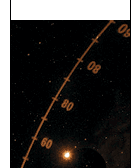

 |
|||
|
Messengers from the Unseen - Page 3 The Quest for Proof During the early years of my work, I tried to establish that "abductions" really were taking place in a literal, physical sense. Sometimes there were reports of missing people, or of physical lesions or marks left on experiencers' bodies after an encounter, or evidence that a type of "implant" was left under the skin, presumably so the beings can monitor their whereabouts. This physical literalness was certainly what most interested the Harvard Medical School committee. But over the years my own emphasis has shifted. I have become convinced that something mysterious and real, not merely the product of the experiencer's mind or psychosocial influences, has been occurring. But larger questions arise as to how we define reality, which is intimately tied to the methodology or way of knowing that is being pursued. In the case of the abduction phenomenon, the physical findings, when present, are quite subtle. They are insufficiently robust to stand on their own or to measure up to mainstream science. The larger question for me has become how we are to consider reports of powerful experiences for which the physical evidence is meager and runs counter to the consensus view of what is possible. Forcing these accounts into a psychiatric box, or dismissing them out of hand, may lead to the loss of information that is immensely important for understanding ourselves and our universe. Ordinarily, a psychiatrist is not primarily concerned with whether what patients are telling him about their lives is factual or true. Useful work can be done by exploring the meaning of what is reported without knowing how much of it should be taken literally. Methodology is a matter of concern within the mental health professions and is sometimes synonymous with good technique or being helpful to a patient or client. There is little at stake theoretically or philosophically. But in the case of the alien abduction phenomenon, which challenges the fundamental ontological paradigm of our society, the stakes are much higher. If these experiences are true, then even my severest critics will acknowledge that we exist in a different cosmos than the one in which most of us, including myself, thought we were living. The consequences are not only scientific, but also affect every institution of our culture. I have come to disagree with the medical school's investigation committee about the methods used to establish or refute the reality of the abduction phenomenon. The committee members emphasized the need for more psychological tests to see what might be wrong with these individuals. They suggested that patients consult with mainstream psychiatrists unfamiliar with the phenomenon and that we explore other explanations, like sleep paralysis (experiencers are often unable to move during encounters, but are usually not asleep). Finally, the committee wanted a further quest for physical proof. Nevertheless, when the implications are so great, how we assess the reality of what a person reports in the absence of compelling physical evidence becomes a matter of immense importance. When evaluating experiencers, I begin with the same clinical assessment I would undertake with any other patient. In particular, I assess if there is anything in the person's background or mental condition that could shed light on what has been reported. Hypnotic relaxation enables memories to come forth or helps the experiencer get in touch with emotions, but is not of much value in establishing what is factually true. I try and determine if a person has anything to gain by inventing such a story, or if he or she has been influenced by other individuals or the media. Finally, I ask, are these patients persons of integrity who are not given generally to fantasy or distortion of reality? Talking with close friends and relatives is helpful in this regard. Is the feeling expressed by the experiencer appropriate to what is being reported? The sheer intensity of terror or other emotion that comes forth when encounter experiences are recalled can help determine if something momentous has in fact occurred. |
|
back to top |